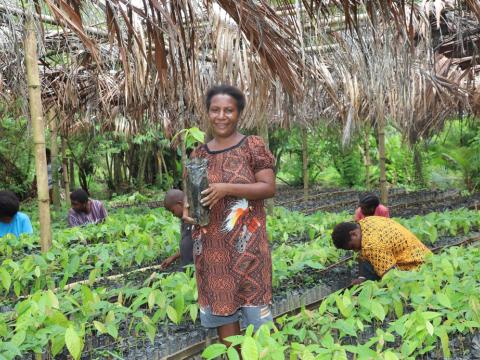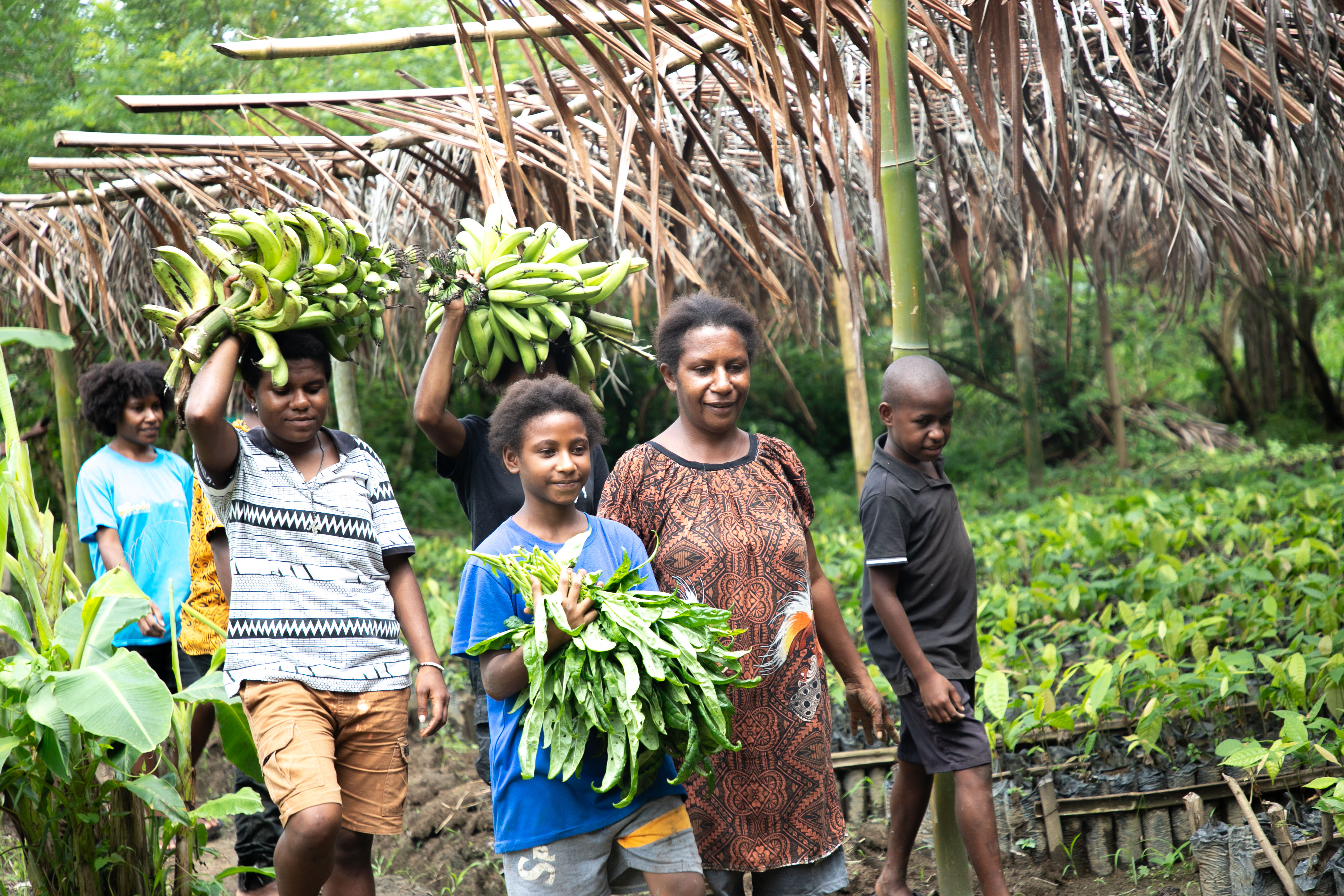Empowered by CACAU, Inspired to Teach

In the rural community surrounding Koroba Primary School, Iewes Dala, a grade five teacher and registered cocoa farmer, utilises the climate smart cocoa farming knowledge, skills and resources she gained through the Climate Smart and Inclusive Cocoa in Usino (CACAU) Project to teach children in her home and classroom to be agriculture smart.
Iewes, who is married to a local, has lived in Usino-Bundi for sixteen years and is currently in her seventeenth year of primary teaching. While she dedicates her full time to teaching in the classroom, her passion for farming becomes evident when the school bell rings at the end of the day.
Since joining the CACAU project in 2024, funded by the Australian Government’s Department of Foreign Affairs and Trade (DFAT), Iewes has taken the initiative to involve her children in volunteering by caring for the nursery established by the project. The nursery houses up to five thousand seedlings, which is equivalent to eight hectares of land for cocoa farming. These hands-on experiences have created a deep connection between the children in school and the vital agricultural practices for their sustainable livelihood and hope for a good future.
“I joined this project because, as a teacher, I had been teaching theory for a long time and wanted to establish a small-scale cocoa farm. This project has allowed me to provide practical lessons to my students in the Making a Living class. After teaching theory in class, I take the students to the nursery and cocoa block to demonstrate how things are done outside the classroom,” she explained.
From these practical lessons, Iewes has coached her students to set up their agricultural plots on the school’s land, where they can be assessed. This approach has empowered the students with skills that go beyond textbooks to cultivate and guard their land, environment and communities. One of the essential agricultural skills the CACAU project teaches cocoa farmers is intercropping and establishing proper drainage systems as applying a good climate-smart approach in their gardens.
“For intercropping, we all know that taking care of cocoa will benefit us, but in the meantime, we need to care for our other crops, as we also depend on the food from our gardens while waiting to harvest and sell our cocoa. By practicing mixed cropping, we save time moving to different locations for gardening and help control pests in our gardens”.
“The climate-smart approach has taught us the importance of digging drains that protect not just our cocoa but also our seasonal crops from being destroyed by heavy rain. We have constructed drains that divert and store excess water to protect our crops. We always ensure the drains are kept clean and ready to collect rainwater during the rainy season.”
“I have taught Making a Living in Upper Primary Schools for most of my teaching career. In this subject, we instruct students on basic agriculture practices, showing them how to sustain their lives through these activities. In rural communities, not all children can proceed to tertiary institutions after completing formal education and secure formal employment. When this happens, they have the opportunity to return to the land for economic sustenance, relying on the skills they have learned in school, even as early as primary education.”
She added that locals living on traditional land in rural areas have the privilege of ownership, and the ANCP CACAU project has provided them with the tools, resources, and knowledge to farm cocoa sustainably for future generations, even after the project concludes, as current farmers have been well trained. These resources have instilled confidence in local farmers to not only continue cocoa farming but also pass on their expertise to the next generation who can adopt to climate change, build community resilience and enjoy land, environment and income from cocoa farming.
“When World Vision PNG implemented the CACAU Project, it united everyone and began training on cocoa farming, finance and family management skills to each registered farmer, so they could become smart cocoa farmers. The knowledge on how to plant and care for cocoa was conveyed in a way that allows us to teach our children or anyone interested in cocoa farming.”
As a registered farmer of the Kou Cocoa Cooperative Society Limited, a teacher, and a mother living in a rural community, Iewes believes that teaching children valuable life skills when given the opportunity is crucial for shaping a future that is self-reliant and can create economic opportunities through working on the land.
“By learning to cultivate the land, children acquire practical skills that can support them for generations and help sustain themselves and their families, especially in rural areas where land is abundant,” she stated.
Her involvement with the CACAU Project has empowered her students and children at home to view cocoa farming and agriculture as a whole, not only as necessities but also as pathways to economic independence, ensuring a more stable and self-reliant future in the long run. By fostering such valuable life skills, Iewes hopes to instill the confidence needed to shape a promising future grounded in resilience, hard work and big dreams for the future.
